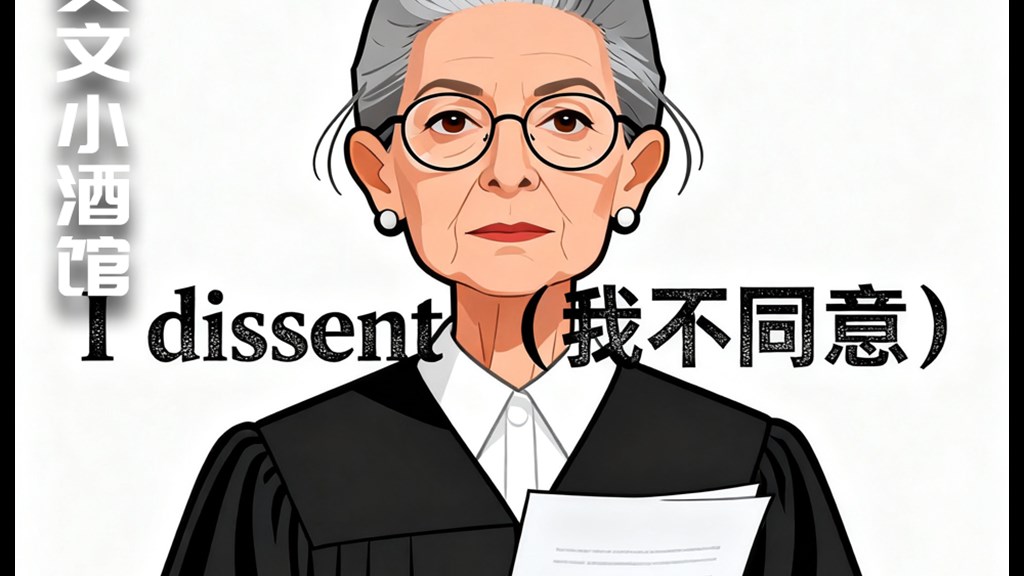异见人生 ,爱 "唱反调 "为什么还能人见人爱 ?





▲点击进入 相应板块

" Agreement and
Disagreement"
PART TWO
△
点击播放音频
KEY WORDS
图片均来源于网络 | 侵删
加小助手VX【luluxjg2】领取全文逐字稿


Ways to Disagree Politely
Start with softer, indirect disagreement forms:


Softening disagreement:
♦ “I see what you mean, but…”
♦ “That’s an interesting point, though I’m not sure I agree.”
♦ “I’m afraid I don’t quite agree with that.”
♦ “You might be right, but have you considered…?”
♦ “I’m not sure that’s always the case.”

Stronger disagreement (still polite):
♦ “Actually, I have a different opinion.”
♦ “To be honest, I disagree with that.”
♦ “I respect your view, but I don’t think that’s true.”
♦ “That’s not how I see it.”
Body language, voice, and facial expressions also matter.


Avoiding Conflict – Softening Language


Use hedging to sound less direct:
♦ “It seems like…”
♦ “Maybe…”
♦ “It could be that…”

Use modal verbs:
♦ “You might be right.”
♦ “I could be wrong, but…”
♦ “We should consider…”

节目文稿全记录
#864

Hello again欢迎来到Happy Hour英文小酒馆。关注公众号璐璐的英文小酒馆,加入我们的酒馆社群,邂逅更精彩更广阔的世界
Hi, everyone and welcome back to Happy Hour, 欢迎回来酒馆. Hi, 安澜.
Hi, Lulu. Hi, everyone!
So moving on from agreement to disagreement, which is an area you need a lot more finesse in, a lot more nuance because disagreement is likely to offend. Some people just really don't like disagreement, especially like if you're dealing with someone who's a stranger, who's much more senior than you, how do you express disagreement politely?
Yeah. Let's start with like some softer disagreements. “I see what you mean, but…”
This is a tricky one, because people generally think “I see what you mean.” like a lot of language learners think that this means agreement. But it's not, it’s just like I understand why you're saying that, but I don't agree.
Exactly. It's like “I understand your point, but…”
Yeah, there's always a but, that's why sometimes you hear the conversation, and then for example, if 安澜 says to me “I see what you mean.” and stop there, I would say come on, where is the “but”? 但是在哪里? I know you're gonna say but.
Exactly, like for example, “That's an interesting point, though, I'm not sure I agree.”
Ah, “though” is just another but.
It's just another formal way of saying “but.”
You can also hear people say, “I agree to some extent, but…”
一定程度上同意which also signals that I also partly disagree.
Yep. Like for example, “I'm afraid I don't quite agree with that.”
Lots of softeners here, “I'm afraid I don't quite agree with that.”
And also they like in language, in sort of diplomatic language or softer language or more polite language, they always say you need to use a positive verb, instead of using a negative verb.
So instead of saying I disagree, say I don't agree, it just sounds nicer. I think it's based on the psychology of the listener.
Oh yeah, so for example, I'm not sure that's always the case.
Always the case. So I'm not saying that's not the case, but that's not always the case and saying I'm not sure that's always the case. 我不确定总是这样吧, so this is a disagreement, but it's a lot softer.
Or you can actually agree first, oh you might be right, but have you considered, but have you considered?
But that you have to be a bit careful with because that's also a little bit kind of like you're trying to teach the other person.
It's very preachy, it's very 爹味.It's a little bit like that. But sometimes we need to voice stronger opinions. It's like some of my students are saying, yeah, but Lulu you gave us all these polite ways of saying disagreement, but sometimes we need to insist on our points and we need to voice stronger disagreement.
Yeah.
How do we say that without sounding too impolite ?
Well, You can say, for example, actually I have a different opinion.
Actually I have a different opinion; or to be honest, I disagree with that; or things like I respect your view or with all due respect.
Okay, with all due respect, you have to be very careful with it.
Because it's so aggressive.
It is very, very passive aggressive. So I respect your view, but I don't think that's true. I respect your view that is quite strong. But if you want to say and make it stronger you say with all due respect.
With all due respect.
It is quite patronizing.
But when you hear people say with all due respect, you know something nasty is going to follow.
Yes.
I think expressing disagreement the point is not just a language, it's the body language, the voice and the facial expressions, these are also very important.
Yeah, so what we would do is with our voices that we would stress certain words, like for example, to be honest, I disagree with that.
Oh, so it's not I disagree with you as I disagree with that particular matter.
I respect your view, but I don't think that's true. So you notice that your stress in the think and the true, you'll not be stressing don't or that's not how I see it.
That's not how I see it.
Yeah, exactly.
I see. I see. And you can also use like hedging words instead of saying this is what the situation, you say it seems like. It seems like; or you say maybe. Or...
It could be that.
It could be that.
So we use these expressions to show that we're still uncertain about something. So we understand that you might have a point. I don't quite agree with it, but I'm not very firm that I'm right as well.
Yeah, you're saying that it's open for discussion.
Yes.
And you might even say things like you might be right or alternatively I could be wrong.
Yeah. But ....
When people say I could be wrong, they very rarely think they are wrong.
No no no, they think they're absolutely right, but they just want to soften it. For example, I would say to 安澜, I could be wrong, but isn't that word pronounced that way instead of the way you just pronounced it.
Exactly.
But there's also a concept called agree to disagree.
Yes.
What does that mean?
That means basically, I don't argue anymore.
I'm tired of arguing.
I'm tired of this discussion, I'm tired of arguing, so let's agree to disagree.
Let's agree to disagree.
That means I'm not going to change your opinion, but you're not going to get me to change my opinion.
Yeah, continuing on this topic on this discussion is pointless.
Pretty much.
Are you the type of person that like to agree to disagree if there are conflicts?
I don't like conflicts. I don't like to try to force someone to agree with me. I will kind of reason with them. I'll give them my reasons, but if they don't agree, then that's up to them as long as it doesn't affect me.
So if you're arguing about something like, say with me, and to you, this is like common sense, but I'm missing that common sense. Do you feel the need to convince me, to make me agree with you?
No, I will give you my reasons. If you don't agree with me, then I will just drop the conversation and think you're stupid.
Okay. It's like let's just drop it. Yeah. If you think so.
Yeah. Whatever, I'm tired, I need a coffee.
Agree to disagree. By the way 安澜, as we're approaching the end of this topic. Have you ever heard of the word 杠精.
Yeah, it's a difficult word to translate.
But I'm sure you have people like that.
Oh yeah, We got so many people, the people who like to argue for arguing sake.
Argue for arguing sake就是为了争论, 为了争吵而争吵. They don't even know, for example, in one situation, they can be fighting on this side because they want to argue with someone, in the next situation they will be arguing on the other side, again, because they want to argue with someone.
Yeah.
So the point is argument. It's not really the point. It's not really the conclusion or the standing. It's the fact that they can disagree with you.
Yeah, they just want to argue with you.
Can't we just say these people are really just argumentative?
You could say argumentative.
Belligerent.
Belligerent, some people will say contrarian, but that is so so old.
I've seen that, but I don't think it's used anymore.
It is probably the closest translation. But if you say that in English, it just sounds very very very old fashioned. We don't actually use that.
Yeah, and I've also seen people translating 杠精 into trolls. They're not trolls. Trolls are more like 喷子.
Yes.
杠精 is they have to have an original argument and they will argue against that. But 喷子 are there more like haters and trolls, they just want to provoke, so they probably initiate instead of argue against something.
Yeah. But then you also have those 杠精 who they just like to focus on the tiny little details. So we would say that they are splitting hairs.
Splitting hairs, what does that mean?
So someone who splits hairs means that they're focusing on the tiny tiny tiny tiny details of an argument.
I see.
So for example, if you are having an argument with someone and they keep saying yeah but what about in this particular situation .
They are changing the post. I think in logic fallacy there's a word for it, but is it like red herring or something?
There's quite a few different kind of logical fallacies that focus on this.
Yeah, but that they don't want to focus on one argument. They just want to keep changing so that they can gain the upper hand.
I think the best way to deal with a 杠精 really is not to engage.
Exactly.
And you say whatever, whatever you say.
Yeah, just say whatever and then secretly think that they're stupid.
Do you know in Chinese how we do that?
How?
When they try to 杠? we just say啊对对对, 对对对. It's like a very passive aggressive way of saying, yeah, you're right, you're right.
Yeah, exactly.
All right. And on that note, we're gonna wrap up this topic about agreement and disagreement. Share with us in a comment section, your experience with 杠精 and any request you want to put in for future topics that you want us to talk about.
So until next time .
We'll see you next time.
Bye
Bye.
排版长图:Jer.ry
文稿校对:王全勤 & Jenny
图片来源:均来源于网络 | 侵删

星标 “璐璐的英文小酒馆”
听见更精彩的故事,遇见更广阔的世界







▲点击以上图片,Get世界精选好物













